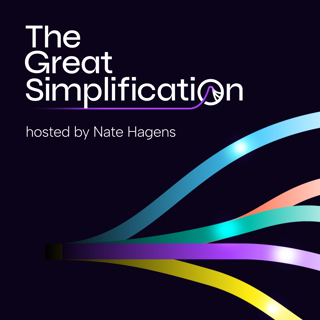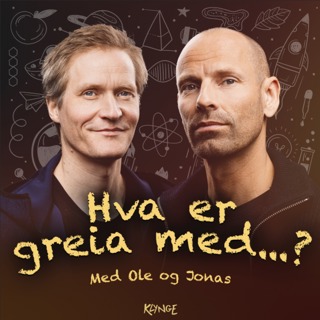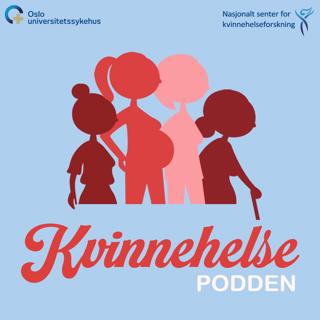
Weakest Links: Depletion, Supply Chains, and Trust | Frankly 71
(Recorded September 18 2024) Over past decades, abundance and peace have become the prevailing narratives in modern societies. The reality, as usual, is both more nuanced and more complex. Today, our financial and material wealth exists in parallel with declines in natural and social capital. Similarly, recent decades have caused us to become uber dependent on global 'just-in-time' supply chains. The unexpected exploding pager incident in Lebanon earlier this week throws the durability of, and trust in global supply chains in a new light. The benefits we've enjoyed from the 'guns and butter comparative advantage' of globalized trade, might also be at risk of decline - and is suddenly something we shouldn't take for granted. In today's Frankly, Nate reflects on 7 key aspects of our socio-economic system which are in decline, with a main focus on the pager implication for globalization. What are the weakest links underpinning the status quo, and how close are they to breaking? Could it be that, just like the stability of our planet and social fabric, trust in global supply chains and globalization be areas of decline too? Show Notes and More Watch video episode on YouTube --- Support The Institute for the Study of Energy and Our Future Join our Substack newsletter Join our Discord channel and connect with other listeners
20 Sep 202410min

Global Heating 101: Rapid-Fire Answers to the Biggest Climate Questions with Stefan Rahmstorf
(Conversation recorded on July 30th, 2024) The science surrounding our planet's dynamic and complex climate can be difficult to understand, and perhaps even more challenging to decipher what the actual realities and trajectories are among so much media coverage. Yet the study of Earth's systems has been ongoing for decades, with a majority of scientists reaching a consensus on the realities of human-driven global heating. In this episode, ocean and climate physicist Stefan Rahmstorf joins Nate for an overview on the most common questions and misconceptions concerning the state of the climate, including the nuances of what our future planetary home might look like. How can carbon dioxide – which makes up such a small percentage of the atmosphere – have such a large effect on the temperature of the whole planet? Why does warming have such huge ripple effects across the biosphere – from ocean currents and wind patterns to extreme weather and wildfires? What do projections for the future tell us about the survivability of some of Earth's most populated regions – and how can communities and nations prepare and mitigate these challenges amid many other converging crises we face? About Stefan Rahmstorf: Stefan Rahmstorf is Co-Head of the Research Department on Earth System Analysis of the Potsdam Institute for Climate Impact Research (PIK) and Professor of Ocean Physics at the University of Potsdam. His research focuses on paleoclimate, ocean circulation, sea level, extreme weather events and Earth System modeling. After working at the New Zealand Oceanographic Institute and the Institute of Marine Science in Kiel, Stefan Rahmstorf joined PIK in 1996. From 2004 to 2013 Stefan Rahmstorf advised the German government as a member of its Advisory Council on Global Change (WBGU). He is not only an outstanding and highly cited scientist but also a sought-after science communicator and speaker, winning the Climate Communication Prize of the American Geophysical Union in 2017. Show Notes and More Watch this video episode on YouTube --- Support The Institute for the Study of Energy and Our Future Join our Substack newsletter Join our Discord channel and connect with other listeners
18 Sep 20241h 41min

U.S. Full Spectrum Dominance: Nuclear Risks and The End of Empire with Jeffrey Sachs
(Conversation recorded on September 3rd, 2024) As the United States continues to play a major role in the conflict between Russia and Ukraine, the risk of a direct engagement, possibly leading to a nuclear exchange, may now be higher than ever. In this episode, Nate is joined by Professor Jeffrey Sachs to discuss the escalating tensions between the United States and other world powers - and whether there are possible avenues towards a more peaceful world order. Has the U.S. taken on the characteristics of an imperial state - under the pretenses of security at all costs? As the world continues to become more globalized, how should we change the way we govern within and across borders? Is it possible to transition from foreign policies focused on dominance and control to those emphasizing interconnectedness and the sovereignty of all nations? About Jeffrey Sachs: Jeffrey Sachs is widely recognized for promoting bold and effective strategies to address complex challenges including the escape from extreme poverty, climate change, international debt and financial crises, national economic reforms, and the control of pandemic and epidemic diseases. Sachs serves as the Director of the Center for Sustainable Development at Columbia University, and was also Director of the Earth Institute there from 2002 to 2016. He is President of the UN Sustainable Development Solutions Network and Co-Chair of the Council of Engineers for the Energy Transition, Commissioner of the UN Broadband Commission for Development. Based on his success in advising Poland's anti-communist Solidarity movement away from central planning, he was invited first by Soviet President Mikhail Gorbachev and then by Russian President Boris Yeltsin to advise on the transition to a market economy. He spent over twenty years as a professor at Harvard University, where he received his B.A., M.A., and Ph.D. degrees. Show Notes and More Watch this video episode on Youtube --- Support The Institute for the Study of Energy and Our Future Join our Substack newsletter Join our Discord channel and connect with other listeners
11 Sep 202450min

Bioregional Futures: Reconnecting to Place for Planetary Health with Daniel Christian Wahl
(Conversation recorded on July 24th, 2024) In the past century of abundant energy surplus, humanity's globalized, large-scale approach to problem-solving has yielded remarkable benefits and innovations. However, as we face a future with reduced energy resources, mounting waste, and a biosphere in danger, the negative impacts of this approach are increasingly overshadowing its gains. How should we evaluate and change these tactics as we look to build future societies that can better attune with their environments and the health of the planet? This week, Nate is joined by Daniel Christian Wahl, a leader and activist in regenerative living, for an exploration into what our lifestyles and communities could look like if we aligned human systems—like agriculture, economy, and community planning—with the natural ecosystems of a specific bioregion to create more sustainable and harmonious ways of living. How can small, incremental improvements made at the local ecological level create emergent benefits for the entire planet? What do we need to unlearn from past centuries of living in order to find balance with nature in the habitats and regions that we call home? How can individuals incorporate regenerative principles into their own lives today, regardless of their surrounding systems? About Daniel Christian Wahl: Daniel Christian Wahl is one of the catalysts of the rising reGeneration movement and the author of Designing Regenerative Cultures - so far translated into seven languages. He works as a consultant, educator and activist with NGOs, businesses, governments and global change agents. With degrees in biology and holistic science, and a PhD in Design for Human and Planetary Health, his work has influenced the emerging fields of regenerative design and salutogenic design. He is the winner of the 2021 RSA Bicentenary Medal for applying design in service to society and was awarded a two year Volans-Fellowship in 2022. Show Notes and More Watch this video episode on Youtube --- Support Institute for the Study of Energy and Our Future Join our Substack newsletter Join our Discord channel and connect with other listeners
4 Sep 20241h 45min

The Physics of Connection: Understanding Relationships and Ecology with Fritjof Capra
(Conversation recorded on May 8th, 2024) Without a systems lens, the full reality of the human predicament will never be understood. It is only when we adopt this kind of holistic, wide-boundary thinking that we are able to see the complexity and nuance of how the biosphere, geopolitics, economics, energy, and many other systems interplay with and influence one another. But historically, the scientific community didn't utilize the power of systems thinking until a few groundbreaking individuals advanced and popularized that way of looking at the world. Today, Nate is joined by one of the great systems thinkers, physicist and deep ecologist Fritjof Capra, to explore how his worldview has been shaped by his decades of work in physics, ecology, and community development – and his conclusions that addressing our ecological and social crises will require a broader shift in our values and philosophies. How are science and spirituality deeply entangled, despite often being falsely separated in modern culture? How would our ideas of consciousness change if we understood the interconnectedness of all life, and our place within it? What could our societies look like if we emphasized the importance of maintaining deeper relationships with the natural world, and prioritized human wellbeing over economic growth? About Fritjof Capra: Fritjof Capra, Ph.D., is a physicist and systems theorist. He was a founding director (1995-2020) of the Center for Ecoliteracy in Berkeley, California. He serves on the faculty of the Amana-Key executive education program in São Paulo, Brazil and is a Fellow of Schumacher College in the UK. Capra is the author of several international bestsellers, including The Tao of Physics, The Web of Life, and The Science of Leonardo. He is coauthor of the multidisciplinary textbook, The Systems View of Life. Capra's online course is based on his textbook. Show Notes Watch this video episode on YouTube --- Support Institute for the Study of Energy and Our Future Join our Substack newsletter Join our Discord channel and connect with other listeners
28 Aug 20241h 3min

The Art of Movement Building: Personal Liberation for Public Change with Mamphela Ramphele
(Conversation recorded on July 17th, 2024) Addressing the risks we face on a global scale is a challenge that can feel both enormous in execution and personally daunting. When it comes to finding the motivation and inspiration to do such work, one of the best sources of insight comes from the visionaries and activists who have come before us, who know what it takes to battle – and successfully transform – entrenched systems of power. What advice and wisdom can we learn from their stories and experience? In this episode, Nate is joined by Mamphela Ramphele, co-founder of the Black Consciousness Movement, which was instrumental in building the ideological foundation that galvanized the struggle for Liberation under the apartheid regime in South Africa, ultimately leading to its dismantling. She shares her wisdom gained from over five decades of movement building and liberation as a means of structural change; something that is deeply relevant to positive outcomes during the coming Great Simplification. What does it mean to be self-liberated and what role does this process play in propeling shifts in cultural values? How can we work across and within generations to create movements that transcend immediate and near term-goals? Is it possible to create policies founded on a deeper set of values- - and could doing so encourage more people to become 'Guardians of the Planet'? About Mamphela Ramphele: Dr. Mamphela Ramphele has had a celebrated career as an activist, global public servant, academic, businesswoman and thought leader. Dr. Ramphele was co-founder of The Black Consciousness Movement with Steve Biko that reignited the struggle for freedom in South Africa. She holds a PhD in Social Anthropology, is a medical doctor, and is the co-founder of ReimagineSA, the former co-president of The Club of Rome, and is the Chair at the Desmond Tutu IP Trust. Show Notes and More Watch this video episode on Youtube --- Support Institute for the Study of Energy and Our Future Join our Substack newsletter Join our Discord channel and connect with other listeners
21 Aug 20241h 23min

Ask Me Anything - Your Questions About TGS Answered | Frankly 70
(Recorded August 11, 2024) The content of The Great Simplification (on Youtube and in real life) can be complex, nuanced and multi-faceted. In today's Frankly, Nate offers reflections on a selection of viewers' direct questions about the myriad topics covered on this channel. The goal of this podcast is to integrate the head, the heart and the hands by building a generative conversation between many more humans. The learning process about upcoming constraints and opportunities will continue to be interactive and ongoing. By offering insightful responses to questions both personal and professional, this Frankly (and future AMAs) directly engages our online community to better understand the nuances of the reality we face and what might be some realistic pathways ahead. What exactly is the relationship between energy and economic growth? What has Nate learned over the last 2.5 years of podcast recordings and what could be done differently? How might we better organize our infrastructure, communities and local politics to prepare for the upcoming Great Simplification? And of course, the question we've all been asking ourselves… How are Nate's ducks?? Show Notes Watch this episode on YouTube --- Support The Institute for the Study of Energy and Our Future Join our Substack newsletter Join our Discord channel and connect with other listeners
16 Aug 202439min

The Population Problem: Human Impact, Extinctions, and the Biodiversity Crisis with Corey Bradshaw
(Conversation recorded on July 25th, 2024) Show Summary: Human overpopulation is often depicted in the media in one of two ways: as either a catastrophic disaster or an overly-exaggerated concern. Yet the data understood by scientists and researchers is clear. So what is the actual state of our overshoot, and, despite our growing numbers, are we already seeing the signs that the sixth mass extinction is underway? In this episode, Nate is joined by global ecologist Corey Bradshaw to discuss his recent research on the rapid decline in biodiversity, how population and demographics will change in the coming decades, and what both of these will mean for complex global economies currently reliant on a stable environment. How might the current rate of species loss result in a domino effect of widespread and severe impacts on the health of the biosphere? What are the key factors driving changes in population growth, and how do these vary across different countries and cultures? Could we stabilize these trends and achieve a sustainable balance between biodiversity and human population through targeted policies and initiatives — and how much time is left to act? About Corey Bradshaw: Corey Bradshaw is the Matthew Flinders Professor of Global Ecology and Director of the Global Ecology Laboratory at Flinders University in South Australia. He is also the head of the Flinders Modelling Node of the Centre of Excellence for Australian Biodiversity and Heritage. He has completed three tertiary degrees in ecology (BSc, MSc, PhD) from universities in Canada and New Zealand, and a Certificate in Veterinary Conservation Medicine from Murdoch University. In a world where human activity has precipitated the current Anthropocene extinction event, he aims to provide irrefutable evidence to influence government policy and private behavior for the preservation of our planet's biowealth. He has published over 300 peer-reviewed scientific articles, 13 book chapters and 3 books, including The Effective Scientist and Killing the Koala and Poisoning the Prairie. --- Support Institute for the Study of Energy and Our Future Join our Substack newsletter Join our Discord channel and connect with other listeners --- Show Notes and More Watch this video episode on Youtube
14 Aug 20242h




















